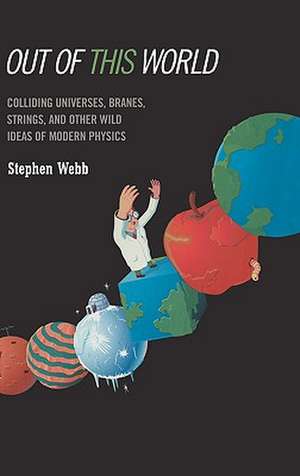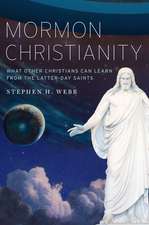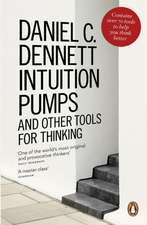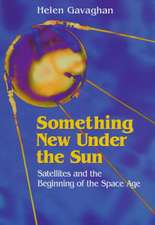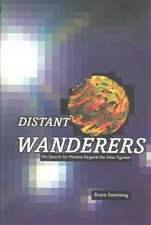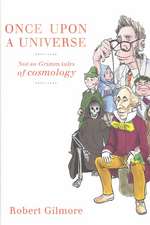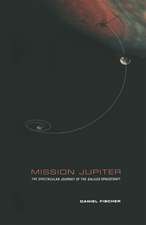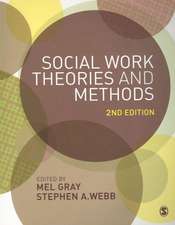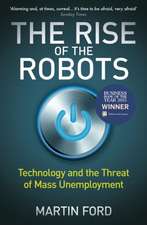Out of this World: Colliding Universes, Branes, Strings, and Other Wild Ideas of Modern Physics
Autor Stephen Webben Limba Engleză Hardback – 24 mai 2004
| Toate formatele și edițiile | Preț | Express |
|---|---|---|
| Paperback (1) | 188.94 lei 22-36 zile | |
| Springer – 11 dec 2011 | 188.94 lei 22-36 zile | |
| Hardback (1) | 264.56 lei 22-36 zile | |
| Springer – 24 mai 2004 | 264.56 lei 22-36 zile |
Preț: 264.56 lei
Nou
Puncte Express: 397
Preț estimativ în valută:
50.64€ • 55.02$ • 42.56£
50.64€ • 55.02$ • 42.56£
Carte disponibilă
Livrare economică 31 martie-14 aprilie
Preluare comenzi: 021 569.72.76
Specificații
ISBN-13: 9780387029306
ISBN-10: 0387029303
Pagini: 308
Ilustrații: XII, 308 p. 221 illus.
Dimensiuni: 155 x 235 x 29 mm
Greutate: 0.65 kg
Ediția:2004
Editura: Springer
Colecția Copernicus
Locul publicării:New York, NY, United States
ISBN-10: 0387029303
Pagini: 308
Ilustrații: XII, 308 p. 221 illus.
Dimensiuni: 155 x 235 x 29 mm
Greutate: 0.65 kg
Ediția:2004
Editura: Springer
Colecția Copernicus
Locul publicării:New York, NY, United States
Public țintă
Popular/generalDescriere
This book is an attempt to share some of the fascinating and exciting ideas of modern theoretical physics with a non-mathematical audience. I also hope to give some appreciation of the exceptionally creative people who have generated these ideas. I had no intention of writing a comprehen sive history of these ideas, however; I apologize to those physicists whose important contributions I may have omitted. Several people have contributed directly to the writing of this book, and I would like to take this chance to thank them. Clive Horwood of Praxis Publishing and Paul Farrell of Copernicus Books have both been supportive of the project. Anna Painter has been an exceptionally thorough editor and has provided invaluable advice. Dr John Mason and Lyman Lyons both offered constructive criticism of an early draft. The errors that remai- and errors and misinterpretations are inevitable in any attempt to explain the subtle ideas of theoretical physics without the aid of mathematics - are my sole responsibility. I would like to thank Ron, Ronnie, Peter, Jackie, Emily, and Abigail for their support. And, most importantly, I would like to thank Heike and Jessica for their patience. Stephen Webb Milton Keynes, April 2004 1X FIGURE CREDITS I would like to acknowledge the following sources and copyright holders for granting permission to use their images. Figure 8 is from the Wilson A. Bentley collection. Figure 14 is courtesy ofNASA.
Cuprins
1: Symmetry.- 2: Twin Pillars of Physics.- 3: Building Blocks of the Universe.- 4: The Standard Model.- 5: Guts and Susy.- 6: Higher Dimensions.- 7: Superstrings.- 8: The Story of M.- 9: Of Branes and Black Holes.- 10: Our World as a Hologram.- 11: When Worlds Collide.
Recenzii
From the reviews:
“This book is an attempt to share some of the fascinating and exciting idea of modern theoretical physics with a non-mathematical audience. As such, it contains no equations, with the ideas involved in the equations carefully described and illustrated by numerous illustrations. … The author has produced a delightful and remarkable book, which is warmly recommended to anyone who is curious about modern theoretical physics.” (Joseph D. Zund, zbMATH, Vol. 1267, 2013)
"This book explores colliding universes, branes, strings and other wild ideas of modern physics. It is aimed at the non-mathematical reader. … The style … is lively and engaging. … Webb, employed by the Open University in the U.K. has a bright and breezy style, which enlivens the most tortuous of subject matter. Highly recommended as a layman’s non-mathematical introduction to some of the weirdest physics around, the book is complete with a necessary glossary and bibliography, with recommended further reading." (Roger Feasey, Journal of the Auckland Astronomical Society, June, 2005)
"Stephen Webb’s … ‘Out of this World’, is a challenge to those of us who might suspect branes to be a typo and have only a utilitarian view of strings … . Webb skillfully conveys the meaning of many advanced concepts of theoretical physics, such as renormalisation and gauge symmetries. … the book has a useful glossary and index. Webb is good on the history of modern thought on the mysteries of nature, introducing the original thinkers. … a nice book for us non-theoreticians." (Colin Keay, The Physicist, Vol. 41 (6), November/December, 2004)
"For more than 20 years, the physical theory of the fundamental nature of matter and force has stood almost motionless. It describes everything and explains nothing, and now a group of researchers is playing with radical revisions … in order to get ideas moving again. … Webb writes clearly and exactly, and is obviously in close touch with recent developments." (D. Park, CHOICE, Vol. 42(3), November, 2004)
"After introducing general relativity and quantum mechanics – the twin foundations of twentieth century physics – he explains how they are fundamentally incompatible. … Webb makes these strange and wonderful goings-on accessible, engaging, and enjoyable, conveying not just what theories have begun to believe about the cosmos, but the awe and excitement felt by scientists as this new picture of the Universe slowly emerges." (www.firstscience.com, October, 2004)
"Webb’s latest book is a look at strings and other things that might underlie the structure of the Universe. Unlike other books … this one manages to take on the subject in a truly accessible way … . it is perhaps the best introduction available at this level of the subject." (Richard Wentk, Focus, September, 2004)
"After introducing general relativity and quantum mechanics … . Then, in a series of increasingly astonishing chapters, he introduces us to the seemingly outlandish and bizarre proposals – from almost unbelievably small particles to huge membranes that may envelope our Universe … ultimately leading to us to wholly new realms of understanding. Webb makes these strange and wonderful goings-on accessible, engaging and enjoyable … ."
‘Webb helps readers understand what’s involved by defining the concepts of symmetry and space-time … . Webb presents these ideas so that even nonspecialists can grasp the basics of topics as esoteric as alternative dimensions and particle physics.’
“This book is an attempt to share some of the fascinating and exciting idea of modern theoretical physics with a non-mathematical audience. As such, it contains no equations, with the ideas involved in the equations carefully described and illustrated by numerous illustrations. … The author has produced a delightful and remarkable book, which is warmly recommended to anyone who is curious about modern theoretical physics.” (Joseph D. Zund, zbMATH, Vol. 1267, 2013)
"This book explores colliding universes, branes, strings and other wild ideas of modern physics. It is aimed at the non-mathematical reader. … The style … is lively and engaging. … Webb, employed by the Open University in the U.K. has a bright and breezy style, which enlivens the most tortuous of subject matter. Highly recommended as a layman’s non-mathematical introduction to some of the weirdest physics around, the book is complete with a necessary glossary and bibliography, with recommended further reading." (Roger Feasey, Journal of the Auckland Astronomical Society, June, 2005)
"Stephen Webb’s … ‘Out of this World’, is a challenge to those of us who might suspect branes to be a typo and have only a utilitarian view of strings … . Webb skillfully conveys the meaning of many advanced concepts of theoretical physics, such as renormalisation and gauge symmetries. … the book has a useful glossary and index. Webb is good on the history of modern thought on the mysteries of nature, introducing the original thinkers. … a nice book for us non-theoreticians." (Colin Keay, The Physicist, Vol. 41 (6), November/December, 2004)
"For more than 20 years, the physical theory of the fundamental nature of matter and force has stood almost motionless. It describes everything and explains nothing, and now a group of researchers is playing with radical revisions … in order to get ideas moving again. … Webb writes clearly and exactly, and is obviously in close touch with recent developments." (D. Park, CHOICE, Vol. 42(3), November, 2004)
"After introducing general relativity and quantum mechanics – the twin foundations of twentieth century physics – he explains how they are fundamentally incompatible. … Webb makes these strange and wonderful goings-on accessible, engaging, and enjoyable, conveying not just what theories have begun to believe about the cosmos, but the awe and excitement felt by scientists as this new picture of the Universe slowly emerges." (www.firstscience.com, October, 2004)
"Webb’s latest book is a look at strings and other things that might underlie the structure of the Universe. Unlike other books … this one manages to take on the subject in a truly accessible way … . it is perhaps the best introduction available at this level of the subject." (Richard Wentk, Focus, September, 2004)
"After introducing general relativity and quantum mechanics … . Then, in a series of increasingly astonishing chapters, he introduces us to the seemingly outlandish and bizarre proposals – from almost unbelievably small particles to huge membranes that may envelope our Universe … ultimately leading to us to wholly new realms of understanding. Webb makes these strange and wonderful goings-on accessible, engaging and enjoyable … ."
‘Webb helps readers understand what’s involved by defining the concepts of symmetry and space-time … . Webb presents these ideas so that even nonspecialists can grasp the basics of topics as esoteric as alternative dimensions and particle physics.’
Notă biografică
Stephen Webb works in Learning and Teaching Solutions at the Open University, England, and is the author of WHERE IS EVERYBODY? (Copernicus Books, 2002.)
Textul de pe ultima copertă
Seeing beyond the Big Bang. . .
Although it is now almost unanimously accepted that the cosmos started with the Big Bang, we still have no plausible theory for the forces that set this creative cataclysm in motion. Some of the most profound questions of modern science arise out of the difficulties scientists have explaining how our Universe was born. What happened, indeed what was, before the Big Bang? During the past few years cosmologists have begun to develop new ideas, sometimes fantastic, that are beginning to shed light on such questions.
In OUT OF THIS WORLD, Stephen Webb examines these amazing recent theories. After introducing general relativity and quantum mechnanics-the twin foundations of twentieth-century physics-he explains how they are fundamentally incompatible. Then, in a series of increasingly astonishing chapters, he introduces us to the seemingly outlandish and bizarre proposals-from almost unbelievably small particles to huge membranes that may envelope the Universe-that physicists have devised to account for this incompatibility, ultimately leading us to wholly new realms of understanding.
Webb makes these strange and wonderful goings-on accessible, engaging, and enjoyable, conveying not just what theorists have begun to believe about the cosmos, but the awe and excitement felt by scientists as this new picture of the Universe slowly emerges.
Although it is now almost unanimously accepted that the cosmos started with the Big Bang, we still have no plausible theory for the forces that set this creative cataclysm in motion. Some of the most profound questions of modern science arise out of the difficulties scientists have explaining how our Universe was born. What happened, indeed what was, before the Big Bang? During the past few years cosmologists have begun to develop new ideas, sometimes fantastic, that are beginning to shed light on such questions.
In OUT OF THIS WORLD, Stephen Webb examines these amazing recent theories. After introducing general relativity and quantum mechnanics-the twin foundations of twentieth-century physics-he explains how they are fundamentally incompatible. Then, in a series of increasingly astonishing chapters, he introduces us to the seemingly outlandish and bizarre proposals-from almost unbelievably small particles to huge membranes that may envelope the Universe-that physicists have devised to account for this incompatibility, ultimately leading us to wholly new realms of understanding.
Webb makes these strange and wonderful goings-on accessible, engaging, and enjoyable, conveying not just what theorists have begun to believe about the cosmos, but the awe and excitement felt by scientists as this new picture of the Universe slowly emerges.
